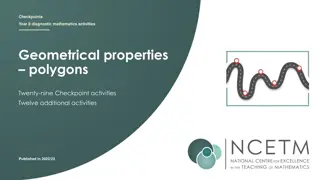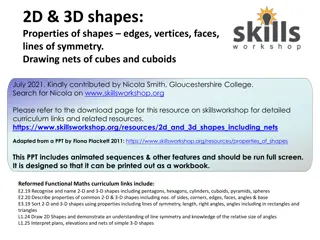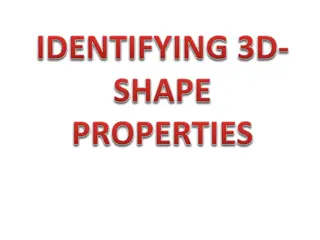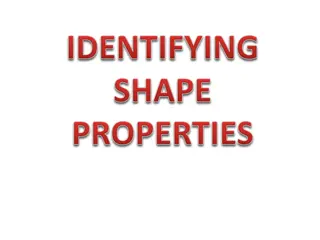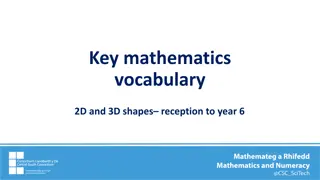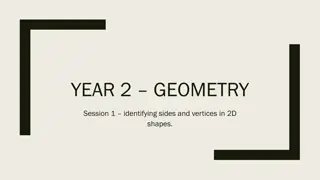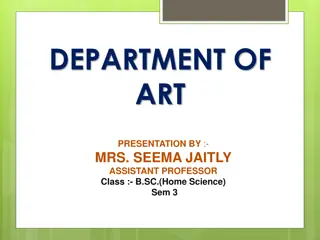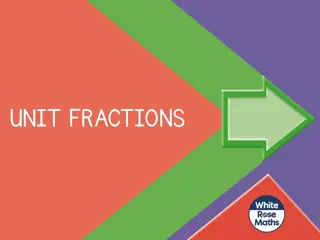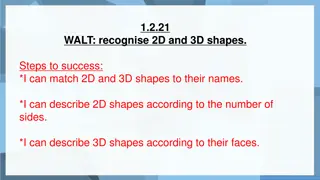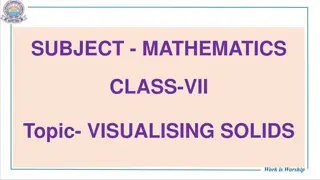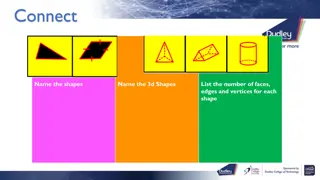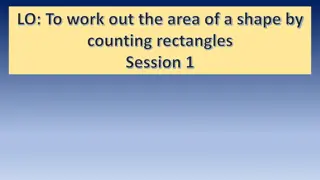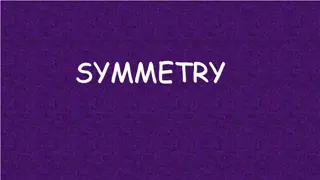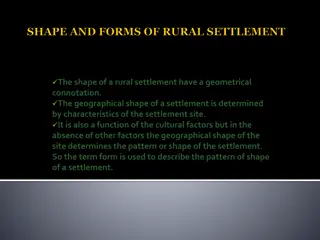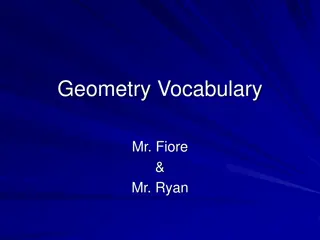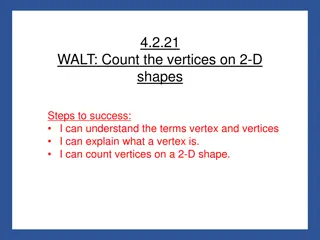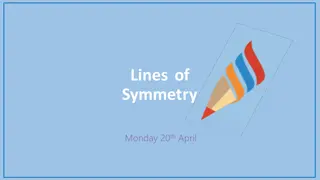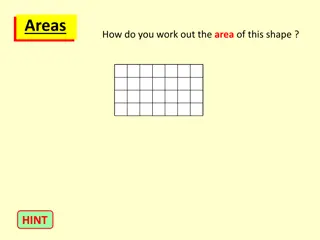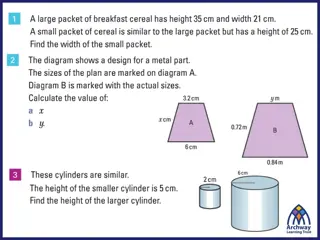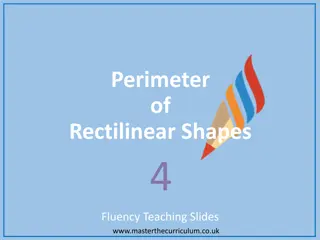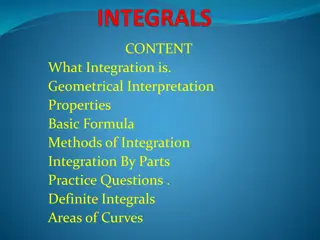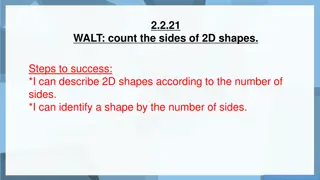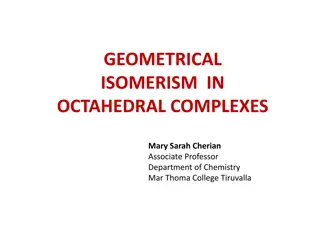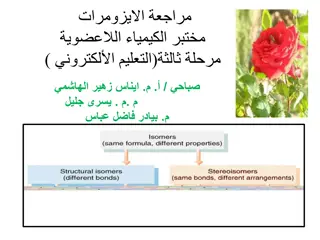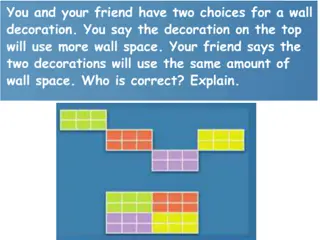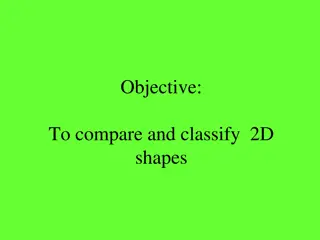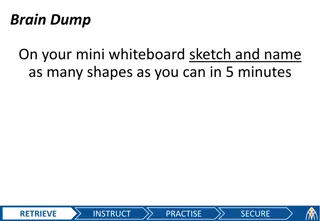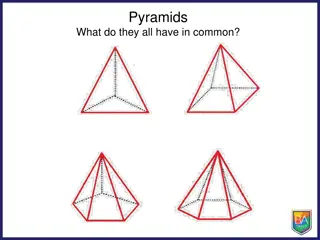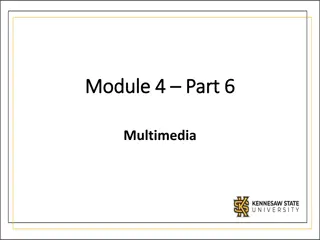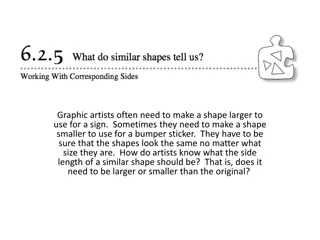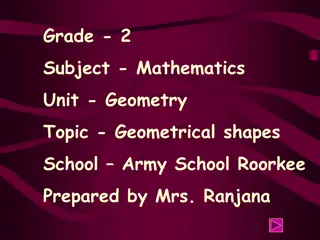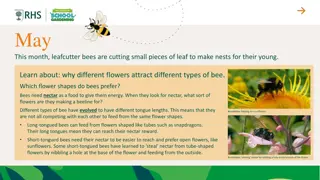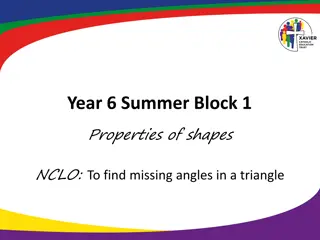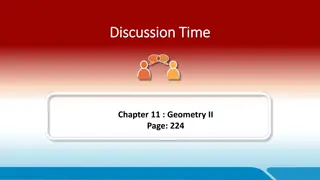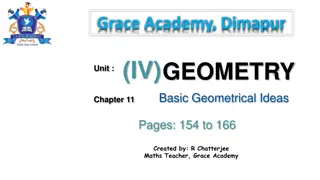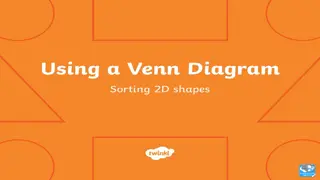Year 8 Mathematics Checkpoints - Geometrical Properties of Polygons
Explore the Year 8 Mathematics Checkpoints focusing on geometrical properties of polygons. Discover activities, underpinning codes, and essential concepts related to angles, line segments, and shapes. Delve into intriguing questions like angles of 400 degrees, bottle lids turning, and angle estimati
2 views • 86 slides
Exploring 2D and 3D Shapes with Nets and Properties
Dive into the world of 2D and 3D shapes with a focus on properties, edges, vertices, faces, and lines of symmetry. Discover how to draw nets for cubes and cuboids, identify shapes, name 3D shapes, and understand mathematical definitions. Engage in activities that challenge your knowledge of shapes a
0 views • 16 slides
Explore 3D Shapes: Properties and Examples
Unveil the fascinating properties of 3D shapes through engaging visuals and descriptions. Identify shapes based on their faces, edges, vertices, and unique characteristics like curved faces or square-based structures.
0 views • 17 slides
Shapes and Their Properties
Explore the properties of 2D shapes such as sides, vertices, and unique characteristics through engaging visuals and descriptions. Learn about common shapes like circles, triangles, squares, rectangles, pentagons, hexagons, and heptagons. Enhance your understanding of geometry in a fun and interacti
1 views • 17 slides
Mastering 2D and 3D Shapes Vocabulary from Reception to Year 5
Explore essential 2D and 3D shapes vocabulary for students from reception to Year 5, encompassing a variety of shapes such as cubes, pyramids, spheres, cones, cylinders, and more. The comprehensive list includes both two-dimensional and three-dimensional shapes, providing a solid foundation for unde
3 views • 9 slides
Identifying Sides and Vertices in 2D Shapes for Year 2 Geometry Session
In this geometry lesson, we explore various 2D shapes such as square, triangle, circle, rectangle, pentagon, hexagon, heptagon, and octagon. We learn about the number of sides and vertices each shape has, distinguishing between shapes based on their unique characteristics.
1 views • 10 slides
Understanding the Elements of Art: Point, Line, Shape, and More
Explore the fundamental elements of art presented by Mrs. Seema Jaitly, Assistant Professor for B.Sc. Home Science Sem.3. Discover how points, lines, shapes, sizes, spaces, textures, and colors form the basis of creativity. Delve into the types of lines such as vertical, horizontal, curved, and diag
1 views • 25 slides
Fractions and Shaded Shapes
Explore fractions by identifying shaded parts in different shapes. Learn about unit fractions with a numerator of 1, and practice determining fractions of shaded areas. Understand the concept of unit fractions and apply it to various scenarios involving shapes and fractions.
0 views • 21 slides
Shapes Recognition Activities for Students
Explore various 2D and 3D shape recognition activities including matching shapes to names, identifying shapes based on sides and faces, and sorting shapes into categories. Engage in fluency exercises to name and match shapes, reasoning challenges, and problem-solving tasks to enhance shape recogniti
0 views • 12 slides
Understanding Geometric Shapes through Visualization in Mathematics for Class 7
Explore the concept of visualising solids in mathematics for Class 7 students. Learn to associate 2D drawings with 3D shapes, visualize various solids, identify their properties, and develop skills in drawing sketches. The chapter covers learning objectives, recapitulation of shapes around us, intro
1 views • 35 slides
Understanding Metric Units of Measurement in Mathematics
Explore the world of metric units in mathematics through the measurement of length, weight, and capacity. Learn about converting between units and applying these concepts to real-world scenarios. Discover the properties of shapes and delve into 3D shapes by counting faces, edges, and vertices. Engag
1 views • 21 slides
Understanding Area of Shapes through Rectangles
This educational session focuses on learning to calculate the area of shapes by counting rectangles. It covers concepts of perimeter and area, providing visual examples and challenges to reinforce understanding. Students will engage in activities to practice determining the area of various shapes by
0 views • 35 slides
Understanding Symmetry in Shapes: A Visual Exploration
Delve into the world of symmetry with explanations and visual examples of line symmetry in shapes like squares, kites, and parallelograms. Explore the concept of rotational symmetry and try your hand at completing shapes based on given lines of symmetry. Discover the special properties of the letter
1 views • 23 slides
Geometrical Patterns in Rural Settlements: Shapes and Designs
The geographical shape of a rural settlement plays a significant role in determining its pattern. Various shapes such as rectangular, linear, star-shaped, T-shaped, and more are formed based on the site characteristics and cultural factors. Different settlement designs like compact or dispersed are
0 views • 8 slides
Exploring Geometry Vocabulary with Mr. Fiore & Mr. Ryan
Geometry, the study of shapes, has its roots in Ancient Mesopotamia and Ancient Egypt. Concepts such as point, line, ray, endpoint, line segment, vertex, congruent, vertical line, horizontal line, and plane are essential in understanding geometric relationships and structures. This visual guide prov
0 views • 22 slides
Mastering 2-D Shape Vertices: Learning Guide
Understand the concept of vertices on 2-D shapes, learn how to count vertices, identify shapes based on their vertices, and determine the odd one out in a group of shapes. Explore the number of vertices in various shapes like a triangle, rectangle, pentagon, hexagon, octagon, and even a circle. Test
5 views • 16 slides
Geometry Learning - Lines of Symmetry Activities
Explore various activities focused on lines of symmetry in shapes. Engage in identifying symmetrical shapes, finding lines of symmetry through folding, sorting shapes based on symmetrical properties, drawing lines of symmetry, and reasoning about symmetrical shapes. Enhance your understanding of sym
0 views • 16 slides
Calculate Area of Various Shapes - Geometry Challenges
Discover how to calculate the area of different shapes through hints and visual aids such as squares, rectangles, triangles, and more. Learn to find areas of composite shapes, missing triangles, and shapes with corners cut off. Practice working out areas based on dimensions provided in each scenario
0 views • 10 slides
Understanding Similarity and Congruence in Geometry
The difference between congruence and similarity lies in how shapes are compared. Congruent shapes are identical in size and shape, with equal side lengths and angles. Similar shapes have proportional side lengths and equal angles, appearing alike but not identical. Scaling factors play a crucial ro
0 views • 20 slides
Perimeter of Rectilinear Shapes Teaching Slides
Explore activities to find the perimeter of rectilinear shapes with missing measures. Use bar models to help calculate perimeters. Discover how to create different shapes with a perimeter of 24 cm. Engage with interactive teaching slides for fluency in perimeter calculations.
0 views • 14 slides
Understanding Integration: Geometrical Interpretation, Properties, and Methods
Integration is the inverse process of differentiation, where we find a function whose differential is given. This process involves basic formulae, methods like integration by parts, and geometrical interpretation. Properties of indefinite integrals and techniques such as integration by substitutions
6 views • 28 slides
Exploring 2D Shapes and Sides in Mathematics
Dive into identifying and counting the sides of 2D shapes through informative practices like describing shapes by their sides, recognizing shapes by their side count, and solving engaging problems related to shapes and sides. Explore the properties of various polygons, such as squares, triangles, pe
0 views • 11 slides
Geometrical Isomerism in Octahedral Complexes: A Comprehensive Overview
Geometrical isomerism in octahedral complexes is a fascinating phenomenon arising from different geometric arrangements of ligands. This type of isomerism is prevalent in coordination numbers 4 and 6, leading to two main types of geometric isomers. Examples of cis-trans and mer-fac isomers in MA2B4
5 views • 10 slides
Understanding Geometrical Isomers in Potassium Chromate Complexes
Explore the preparation methods, crystal shapes, and properties of cis and trans isomers of potassium chromate complexes. Learn about the use of oxalic acid and potassium dichromate, compare the two isomers, and understand the oxidation and reduction reactions involved.
3 views • 8 slides
Geometry Concepts: Perimeter, Circumference, and Area
Explore the fundamental concepts of perimeter, circumference, and area in geometry through a series of problems and visuals. Understand how to calculate the perimeter of a rectangle, find the circumference of a circle, determine area in the coordinate plane, and solve for area of rectangular and irr
0 views • 13 slides
Exploring 2D Shapes: A Comprehensive Comparison and Classification
Discover various 2D shapes such as circles, polygons, quadrilaterals, squares, rectangles, kites, rhombuses, trapeziums, pentagons, hexagons, and octagons. Learn about their unique characteristics, number of sides, angles, and distinctions. Identify shapes based on the number of sides they possess,
0 views • 14 slides
Engaging English Lesson on Shapes and Rhymes for Second Graders
Explore an interactive English lesson for second-grade students focusing on shapes and rhymes. The lesson includes activities such as safety greetings, reviewing previous lessons, and reciting rhymes about shapes like circles and squares. Students will enhance their listening and speaking skills by
0 views • 16 slides
Understanding Platonic Solids: Shapes of Harmony and Elements
Explore the fascinating world of Platonic solids, 3D shapes with faces made of regular polygons, each representing a different element. Dive into the history, symbolism, and unique characteristics of the tetrahedron, cube, octahedron, and dodecahedron through their elemental associations. Discover t
0 views • 12 slides
Exploring 2D Shapes and Polygons
Uncover the world of 2D shapes and polygons with a brain dump session, identifying common shapes like triangles, quadrilaterals, and polygons with Greek and Latin numerical prefixes. Learn the distinguishing features of shapes, symbols used to represent key characteristics, and how markings denote e
0 views • 27 slides
Understanding Pyramids and Prisms in Geometry
Explore the common characteristics of pyramids and prisms, learn about their definitions, faces, edges, and vertices, and understand Euler's formula for polyhedra. Discover the properties of different pyramids and prisms and predict results based on various base shapes. Verify Euler's formula for pr
0 views • 14 slides
Exploring Drawing Capabilities in Pygame: Shapes, Multimedia, and More
Utilize Pygame to go beyond drawing rectangles and explore drawing circles, lines, shapes of any format, and importing images. Enjoy playing music and multiple sounds simultaneously. Learn about useful functions in the Draw module and how to draw various shapes onto Surfaces using parameters and fun
0 views • 26 slides
Geometrical Constructions and Solutions in Mathematics
Explore a variety of geometrical constructions and solutions in mathematics, including elementary algebraic sentences, harmonic division of a segment, the Apollonian problem, and Lemoines Construction. These visualizations illustrate complex and exact methods used in geometric problem-solving, such
0 views • 12 slides
Understanding Scale Factors and Similar Shapes in Graphic Design
Graphic artists often need to resize shapes for different purposes while ensuring they maintain their original proportions. This involves determining the scale factor between similar shapes, understanding how to find the scale factor using corresponding sides, and dealing with scenarios where sides
0 views • 8 slides
Exploring Geometrical Shapes in Grade 2 Mathematics
Dive into the world of geometrical shapes in Grade 2 Mathematics at Army School, Roorkee. Understand the characteristics, types, and properties of polygons, triangles, quadrilaterals, and circles. Develop creativity, critical thinking, and scientific temper while recognizing and relating different s
0 views • 25 slides
Understanding Bee-Friendly Flowers and Nectar Preferences
Leafcutter bees are busy making nests this month, highlighting the importance of flowers in attracting different bee species based on shapes, nectar availability, and tongue lengths. Different bees prefer various flower shapes for nectar, with long-tongued bees favoring tube-shaped flowers like snap
0 views • 5 slides
Exploring Properties of Shapes: Triangles and Quadrilaterals
Delve into the properties of shapes like triangles and quadrilaterals to uncover missing angles, identify types of triangles, and compare various quadrilateral shapes. Enhance your understanding of angles, opposite angles, and angles within shapes to solve geometric puzzles and problems effectively.
0 views • 37 slides
Geometry II - Understanding Lines and Arcs in a Circle
This content discusses concepts related to geometry, focusing on lines and arcs within a circle. It explores the properties of lines AB and APB, measures of angles AOB and APB, as well as the shapes formed within the circle. The discussion provides a clear understanding of the terminology and geomet
0 views • 4 slides
Understanding Basic Geometrical Ideas in Geometry
Basic Geometrical Ideas in Geometry cover the fundamental concepts of points, lines, and planes. Points are described as having location but no size, lines are infinite sets of points, and collinearity is discussed. The importance of straightness in lines is assumed but not defined. Symbols and nota
0 views • 45 slides
Understanding Venn Diagrams for Sorting Shapes
A Venn diagram, composed of overlapping circles, is a useful tool for sorting objects, numbers, or shapes. This visual aid helps in categorizing shapes based on their attributes like color, sides, and properties. Through a series of interactive examples, learn how to correctly place shapes within a
0 views • 8 slides
Update on USolids/VecGeom Integration in Geant4 by Gabriele Cosmo at CERN EP/SFT
Status update on the implementation and testing of shapes in Geant4 using USolids/VecGeom integration, highlighting open issues, VecGeom shapes usage, and expected geometry features in Geant4 10.3. The transition from USolids to VecGeom as a unified solids library in Geant4, aimed at enhancing geome
0 views • 19 slides
